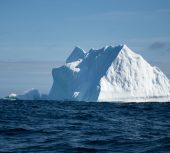Today, in a groundbreaking study published in Nature Climate Change, scientists have unveiled alarming findings about the Gulf Stream, one of the world's most influential ocean currents. The research indicates that over the last two decades, the Gulf Stream has not only warmed faster than the global ocean, but it has also moved closer to the coast. The implications of these changes on global weather patterns, storms, and marine ecosystems are profound.
The Powerhouse of the Atlantic: Understanding the Gulf Stream
Originating from the warm waters of the Caribbean and coursing up the U.S. East Coast, the Gulf Stream is a major component of the global climate system. It is pivotal in transferring heat from the tropics to the northern latitudes, part of the vast Atlantic Meridional Overturning Circulation. As it weaves its path across the Atlantic Ocean, the Gulf Stream shapes weather patterns, nourishes marine ecosystems, and even has ramifications for human communities.

The Gulf Stream shapes weather patterns, nourishes marine ecosystems and even has an impact on human communities
Unraveling the Gulf Stream's Secrets
The mastermind behind this study, Robert Todd, a distinguished physical oceanographer at the Woods Hole Oceanographic Institution (WHOI), collaborated with co-author Alice Ren to delve deep into the mysteries of the Gulf Stream. Their research relied on over 25,000 temperature and salinity profiles gathered between 2001 and 2023.
"We've determined two primary causes for the warming observed near the Gulf Stream," Todd explained. "Firstly, the ocean is absorbing more heat from the atmosphere due to global warming. Secondly, the Gulf Stream is gradually shifting towards the coast."
Their extensive data showcases a 1°C (2°F) rise in the near-surface layer of the Gulf Stream over the past twenty years. Alarmingly, this current is also inching closer to the U.S. Northeastern continental shelf, moving at a pace of about 5 kilometers (3.1 miles) per decade.
Innovative Methods for Ocean Exploration
The research employed cutting-edge technology, including Spray autonomous underwater gliders and the international Argo Program. While Argo floats drift with ocean currents, collecting data, the Spray gliders possess the capability to navigate through waters, giving researchers a comprehensive view below the Gulf Stream's surface.
"Observations from the Spray gliders and Argo floats provide vital details that satellites can't—like what's happening below the ocean surface," said Ren. "This observational data fills the gaps that numerical modeling can't always address, giving us a clearer picture of our changing oceans."
The Wider Implications of a Changing Gulf Stream
The Gulf Stream's fluctuations could spell dramatic changes for coastal fisheries. Rapid oscillations in water temperatures might become more frequent, severely impacting marine life.
However, despite the concerning data, Todd reassured that the Gulf Stream won't shut down entirely, attributing its existence to atmospheric wind patterns and Earth's rotation. "While the Gulf Stream's intensity and position might change, its presence along the U.S. East Coast remains constant," Todd stated.

The Gulf Stream's fluctuations could spell dramatic changes for coastal fisheries
The Way Forward: Research and Adaptation
With climate change being one of the defining challenges of our era, understanding the behavior of the Gulf Stream is paramount. This research, backed by esteemed institutions like the National Science Foundation, Office of Naval Research, NOAA, and WHOI, has furthered our understanding of oceanic dynamics in a warming world.
Alice S. Ren reflected on the study's implications, emphasizing the need for continuous observation and adaptation. "We have much to learn and even more to prepare for," she said. The findings of this study serve as a testament to that, reminding us that understanding our oceans is vital for our planet's future.
©GlobalCO2.uk





